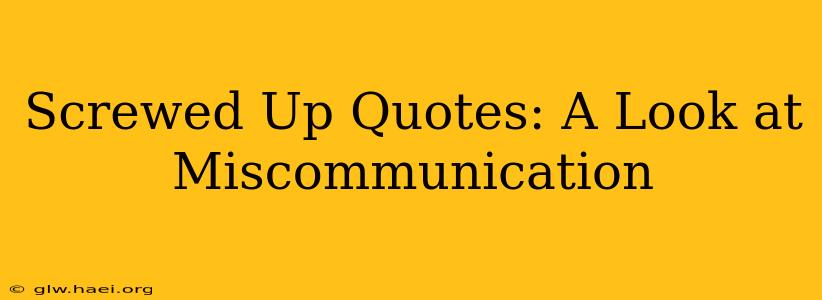Miscommunication. It's the silent saboteur of relationships, careers, and even international diplomacy. We've all been there – the awkward silence after a misinterpreted comment, the escalating argument sparked by a single misunderstood word. But what happens when these miscommunications become immortalized? When a quote, intended to convey one message, is twisted, truncated, or taken wildly out of context? That's where the truly fascinating, and often hilarious, world of "screwed up quotes" emerges. This isn't just about grammatical errors; it's about the power of language, the fragility of meaning, and how easily a simple sentence can be warped into something entirely different.
What Makes a Quote "Screwed Up"?
A "screwed up quote" isn't necessarily a typo or a grammatical error (though those certainly contribute). It's a quote that has been altered in a way that fundamentally changes its original meaning. This can happen through:
-
Truncation: Removing parts of the quote changes the context and often the entire intended message. A powerful statement can be reduced to a cliché, or a nuanced observation can be rendered simplistic and inaccurate.
-
Misattribution: Assigning a quote to the wrong person completely undermines its credibility and can even damage the reputation of the individual falsely credited.
-
Contextual Distortion: Removing the quote from its original setting – the speech, the article, the conversation – drastically alters its meaning. A sarcastic remark can be taken as serious, an opinion expressed in a specific situation can be generalized inappropriately.
-
Intentional Manipulation: Sometimes, quotes are deliberately altered to support a particular agenda or to discredit an opponent. This is a form of misinformation that can have serious consequences.
How Do These Misquotes Spread?
The internet, with its rapid dissemination of information, acts as a breeding ground for misquotes. A slightly altered quote can quickly spread across social media, forums, and news websites, solidifying its inaccurate form in the public consciousness. The ease with which information is copied and pasted without verification contributes to the problem. Once a misquote gains traction, correcting it becomes an uphill battle.
Why Do We Care About Accurate Quotes?
Accurate quotes are crucial for several reasons:
-
Preserving Historical Accuracy: Quotes often serve as historical records, providing insights into past events and the thoughts of important figures. Distorting these quotes distorts history itself.
-
Maintaining Intellectual Honesty: Proper attribution and accurate representation of ideas are vital for maintaining intellectual integrity. Using misquotes undermines the credibility of the source and the arguments presented.
-
Facilitating Understanding: Accurate quotes ensure that the intended message is conveyed accurately, preventing misinterpretations and misunderstandings.
Famous Examples of Screwed Up Quotes
Many famous quotes have been subjected to various forms of manipulation. Finding the original source and comparing it to the common misquote often reveals a stark difference in meaning. For example, (Insert a famous example here, carefully citing the source and showing the difference between the original and the common misquote).
How Can We Avoid Spreading Misquotes?
The responsibility to ensure accurate quotation falls on all of us. Here are some simple steps we can take:
-
Verify the Source: Always check the original source of a quote before sharing it. Don't rely solely on social media or unverified websites.
-
Read the Entire Context: Consider the surrounding text or speech to understand the quote's meaning and intention. A sentence taken out of context can be entirely misleading.
-
Be Skeptical: If a quote seems too good to be true, or too perfectly tailored to support a particular viewpoint, it's worth investigating its accuracy.
-
Correct Misquotes When You See Them: If you encounter a misquote, gently correct it, providing the accurate version and its source.
In conclusion, the world of "screwed up quotes" highlights the importance of accuracy, context, and critical thinking. By being mindful of these factors, we can all contribute to a more informed and honest exchange of information. The next time you encounter a quote, take a moment to consider its origin and whether it truly reflects the original intent. You might be surprised at what you discover.

